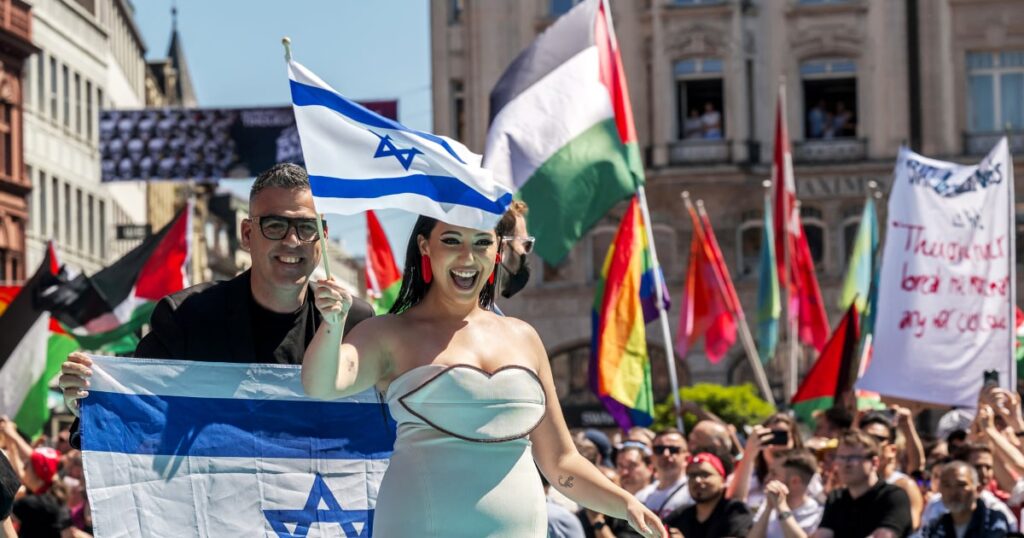
“You can’t ban a personal story from a competition,” she told NBC News in a Zoom interview earlier this month. “So you really get two for one,” she said, with a talented singer performing what sounds like “an old French chanson” paired with a story that makes clear the song is actually about “both a personal trauma and a national trauma, and how you sort of come out of this.”
But much as Israel takes part in various European sports leagues, its inclusion in Eurovision is an example of the Middle Eastern nation viewing itself as part of the European cultural community, an idea that Press-Barnathan says is an important “part of the Israeli societal imagination.”
‘Should be a happy occasion’
On Wednesday evening in central Basel, some 200 protesters demanded Israel be expelled from Eurovision and for an end to the Israeli offensive in Gaza. The crowd, some wearing Palestinian flags, marched in silence down a street ringing with music, The Associated Press reported.
For many critics, Israel’s inclusion in Eurovision is tantamount to accepting its military campaign, which has prompted the International Criminal Court to issue an arrest warrant for Israeli leaders for “crimes against humanity and war crimes,” charges that Israel denies.
Those pushing for the country to be kicked out of the contest — much as Russia was following its full-scale invasion of Ukraine in 2022 — include former participants, more than 70 of whom signed a joint letter earlier this month.
“It should be a happy occasion that Eurovision is finally in Switzerland, but it’s not,” Lea Kobler, a protester from Zurich in Basel, told the AP. “How can we rightfully exclude Russia but we’re still welcoming Israel?”
Participation in Eurovision has long pushed the geographical boundaries of Europe itself. While the contest started with seven countries in 1956, it has vastly expanded and now includes not only Israel, but countries like Georgia, Azerbaijan and even Australia.
Around the edges of last year’s festival in Malmö, Sweden, protests against Israel’s participation reached a fever pitch. Police scuffled with pro-Palestinian protesters who tried to make themselves heard over the pop music blaring outside the stadium as fans lined up to enter.
This year in Basel, demonstrators were highly visible at the opening ceremony of the contest, with large Palestinian flags being waved in the crowd. There were some boos for Raphael as she walked the carpet, and Israel’s X account posted a video of a pro-Palestinian protester making a throat-slitting gesture at the Israeli delegation.

Brigitte Vogel, a spokesperson for the police in Basel, told NBC News in an emailed statement, “The Cantonal Police is aware of the incident and will draw up a report for the responsible prosecution authorities.”
“By continuing to platform the representation of the Israeli state, the EBU is normalising and whitewashing its crimes,” the letter reads. “The EBU has already demonstrated that it is capable of taking measures, as in 2022, when it expelled Russia from the competition. We don’t accept this double standard regarding Israel.”
Some participating national broadcasters, including those from Spain, Iceland and Slovenia, have also questioned whether Israel should take part. Senior leadership from the Irish broadcaster RTÉ last week met with the EBU to raise its own concerns.
In an emailed statement, the EBU said it “will continue to listen to all members. As we did in 2024, we will have a broader discussion when the Contest concludes with all participating broadcasters to reflect on all aspects of this year’s event.”
More protests are expected when Israel competes in Thursday’s semifinal.
Participation amid criticism, Press-Barnathan says, is a way for Israel to fight against its detractors. “It’s the pushback against criticism, delegitimization, all that stuff.” And for a domestic audience, she said, it’s a way of saying, “We’re still here. You know, we’re not going anywhere.”
Meanwhile, the Swiss hosts may just be hoping that by their refusal to take sides, the contest goes off without too much controversy.
 Latest World Breaking News Online News Portal
Latest World Breaking News Online News Portal






